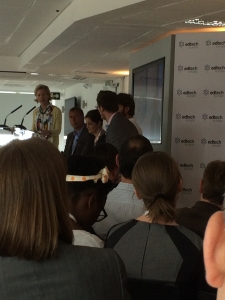This week I attended EdTech Europe at the Millbank Tower in Westminster. Not only did the 29th floor of this skyscraper provide brilliant views of London but a coming together of some of the biggest brains and most influential innovators and investors in the Education Technology community. Although most people in attendance were British other great companies were on display from France, Finland and Germany offering their different perspectives on how to tackle some of the biggest challenges in Education.
Charles McIntyre of IBIS Capital kicked off the day with a keynote speech demonstrating how technology has disrupted the media industry and how this was now happening in Education. He explained we are only at the start of this transformative era which is happening now right in front of our eyes. Benjamin Vedrenne-Cloque co-founder of EdTech Europe went on to show a graph showing how Coursera a 5 year old MOOC start up had caught up with the well established institutions of Oxford and Cambridge University in terms of Google search volumes. Of course MOOCs aren’t going to replace Cambridge and Oxford but the search engine traffic shows the demand for high quality education through affordable MOOC offerings is very real. Ben continued to show a similar graph showing the website traffic of the established BBC websites vs YouTube. It was clear to see how Coursera might grow exponentially over the coming years and even if the completion rates of such MOOC platforms are in question the cost of delivery to the learner brings a massive advantage to bear. Are the MOOCs potentially levelling the playing field for access to Education?
Colin Hughes the CEO of Collins Learning gave a thought provoking talk on how textbooks are not dead. His argument was backed up by evidence that much of the high performing countries in the world have high penetrations of textbook usage and how in the UK policy makers have downplayed the role of the textbook over the years. He explained that building a textbook is as difficult if not as hard as building a Lamborghini car. Colin in essence said that textbooks are here to stay all be it in different forms and with different features. Textbooks in the form of podcasts provide a very cheap way for publishers to get their content out and they are enjoyable for learners especially within a revision context. Furthermore digital ebooks on iPads can provide pop up videos and quizzes to make the learning more interactive.
Dr. Ulrik Juul Christensen Senior Fellow of McGraw Hill gave his keynote speech on how content creation has to change in order to enable adaptive learning. His slides showed the publishing industry at an inflection point where the iceberg is about to crumble. A trend toward smaller content packages of perhaps 1 minute durations is needed to adapt the learning experience for differing learning pathways. Smaller content packages will make the industry open up to smaller more nimble players who will find niches within the industry. Will smaller more agile publishers kill the cash cows of the established publishing houses?
The EdTech Europe Awards led to Better Marks, The Student Room and Busuu being named as winners. Better Marks is a German based Maths software company. Meanwhile the Student Room is a peer to peer learning platform which allows students to learn from one another and Busuu is the largest social network for language learning online.
To conclude the iPad and big data will transform the learning outcomes of the next generation. However the biggest gatekeeper and most essential person in a child’s education is the teacher. It would be good to see more UK teachers becoming teacherpreneurs. One thing that all investors and innovators agree on is that a product must improve learning outcomes and must breakdown barriers to add value. UK investors need to become less risk averse and back high growth EdTech startups. Currently EdTech investments are 10 times higher in the USA than in Europe and the UK EdTech industry must respond if we are to compete on a truly global scale.


